The growing threat of severe weather conditions, including increasingly severe tornadoes, has caused interest in storm shelters to surge.
For many, underground storm shelters aren’t an option. For instance, the high water table in the Mississippi Valley region makes underground structures unfeasible.
This isn’t necessarily a bad thing.
Some experts believe above-ground storm shelters are just as safe and may have some advantages.
Above-ground storm shelters are easier to access, especially for those with mobility issues, and can also provide emergency protection against intruders.
Let’s look at some leading storm shelter manufacturers and their products before establishing what you should look for in a dependable above-ground storm shelter.
A Summary Of The Best Above-Ground Storm Shelter Companies
#1 Valley Storm Shelters
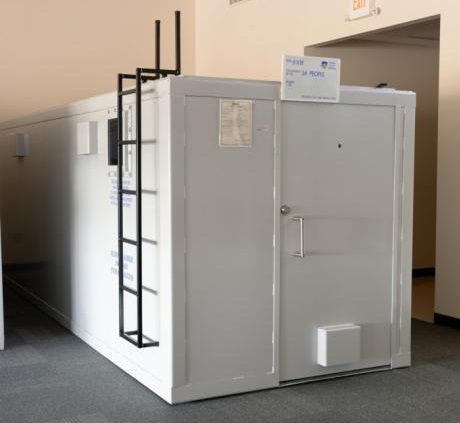
With seven different residential products to choose from, Valley Storm Shelters offers one of the most comprehensive selections of storm shelters. Each shelter is designed to withstand 300 mph ground speed winds, which is what you might expect in the strongest tornadoes ever experienced.
Built with ¼” steel plate and anchored to a concrete foundation using 24-inch carbon steel anchors and industrial anchoring adhesive, Valley Storm Shelters can be installed as stand-alone structures or added to your garage or basement.
These spacious, safe rooms feature safe electrical access, reinforced steel corners, and a vault-like door complete with a drill-proof deadbolt and bullet-resistant peephole.
The smallest shelter Valley Storm Shelters produce, measures 4’x4′ and is big enough to accommodate three people. The largest is more community-focused and can provide shelter for as many as 36.
All Valley Storm Shelters’ products meet the standards set out by the Federal Emergency Management Agency (FEMA) and those established by the International Code Council (ICC) and the National Storm Shelter Association (NSSA) in 2014.
Check them out – Valley Storm Shelters
#2 FamilySAFE
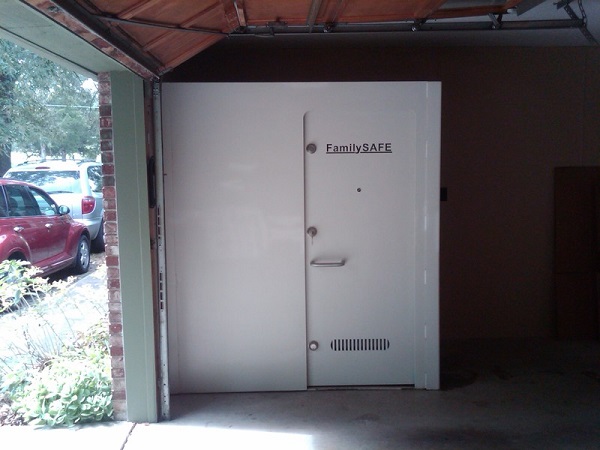
FamilySAFE’s Above-Ground MAX Shelter is comparatively spacious and well-ventilated. Designed to reduce feelings of claustrophobia, this storm shelter is taller than some of the other options available.
The standard model is made with 3⁄16″-thick steel, so it is not quite as strong as Valley Storm Shelters, but a thicker ¼” steel structure is available if you opt to customize it.
The door hinges are attached on the inside to protect them against damage from flying debris, and wider doors are available for those requiring wheelchair accessibility. On the inside, steel bars provide additional structural security for the door.
Welded into a single unit, FamilySAFE has reinforced all the shelter’s joints using technology similar to that of a NASCAR roll cage. In other words, it’s strong enough to withstand around 100,000 lb of weight falling directly on top of it.
You can choose between a solid, welded one-piece unit for external installation or a bolt-together option that can be constructed anywhere in your home. Both models are EF5 certified and feature SAFE-T-DOOR technology that guarantees you’ll never get trapped inside.
FamilySAFE storm shelters are available in nine sizes, starting at 3.5’x5′ and going up to 8’x12′.
Check them out – FamilySAFE
#3 Atlas Safe Rooms
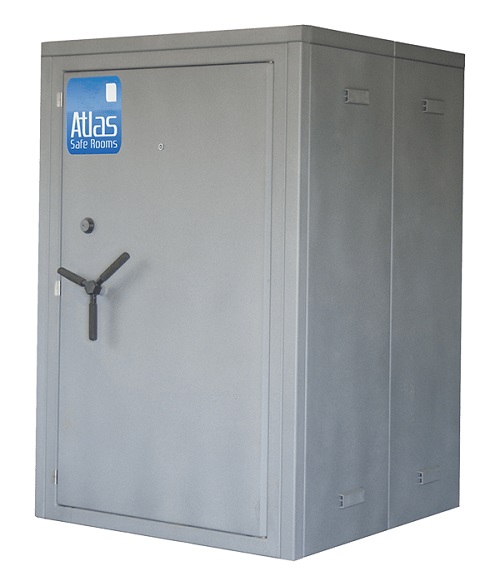
With an American Tornado Shelter Association (ATSA) seal of approval, Atlas Safe Rooms exceed FEMA’s standards and can be installed almost anywhere.
The modular design makes it simple to construct because its built-in panel sections can be easily installed in an existing structure or outside.
Another benefit of the modular design is that, should you move house, you can disassemble your storm shelter and take it with you.
The removable panels also give you an emergency exit should the door become damaged or blocked. Screened airflow vents provide ventilation without exposing you to flying debris, while the three-bolt locking mechanism keeps you safe from whatever threat might be lurking outside.
Atlas Safe Rooms come in six different sizes, starting with the two-person Apollo at 4’5″ x 2’5″. The next size up can accommodate a group of four, while the larger models can protect between 10 and 14 individuals.
Made with steel 3/16″ thick steel) and can be anchored to any substantial existing garage concrete slab, basement slab, or even outdoor slab.
Transparency about pricing is always welcome, and Atlas Safe Rooms make no bones about theirs, probably because they’re so competitive.
Check them out – Atlas Safe Rooms
#4 Safe Sheds
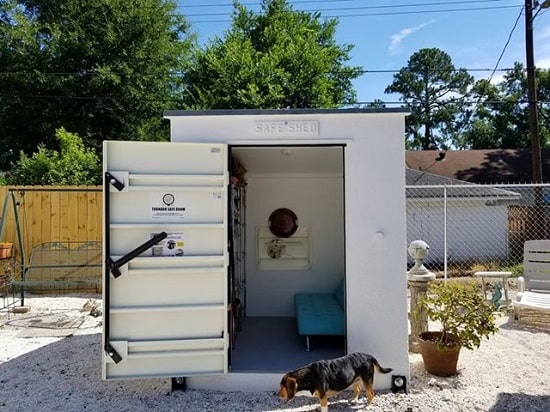
Safe Sheds constructs concrete storm shelters that can withstand winds of over 250 mph and the high-speed debris that comes with it. In 2014, a Safe Shed in Arkansas survived being hit by a pick-up truck, even though the impact bent the truck in half.
Structurally secure, Safe Sheds are available in just two sizes. At 36 sq feet, the smallest is suitable for six people, whereas the larger version can accommodate 16.
A Safe Shed can be constructed on any level ground using screw anchors driven 4′ into the ground. Alternatively, you can secure it onto an existing concrete pad.
Optional extras include an emergency escape hatch and a somewhat pricey FEMA 361 Compliance Kit which comprises a camping toilet, pop-up privacy screen, first aid kit, and fire extinguisher.
With 6″ ceilings and 4″ steel-reinforced walls, Safe Sheds are designed to withstand the most ferocious weather conditions without dramatically denting your bank balance. They even offer a variety of paint colors so your storm shelter won’t stand out like a sore thumb.
Check them out – Safe Sheds
#5 Ground Zero
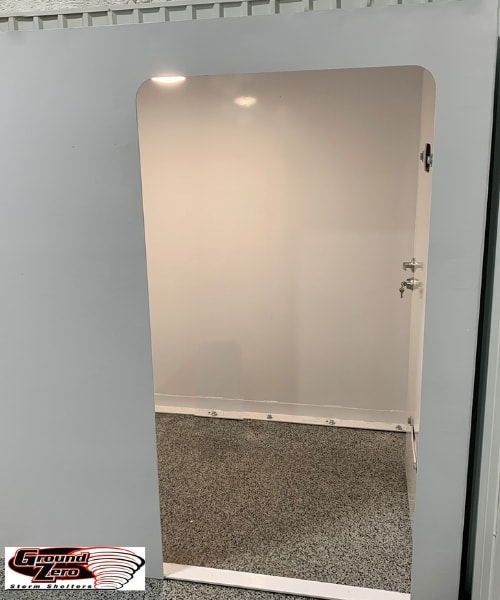
All Ground Zero’s products meet or exceed FEMA and ICC standards and have been impact-tested at the Texas Tech Wind and Science Institute.
The standard storm shelters come in several sizes, each of which is 6’3″ tall. The smaller design can accommodate eight people, and the larger one as many as 10. Custom sizes are also available, so if you want a 4’x4′ shelter for two people, Ground Zero can build you one.
Like Valley Storm Shelters, Ground Zero uses a ¼” steel plate for the main structure. This is secured to a 4″ concrete slab using a Hilti bolt anchoring system (HUS), which can withstand 10,000 PSI.
The 36″ door is suitable for wheelchair access and is reinforced with five locks, including one deadbolt lock. Two vents provide air circulation and emergency access for responders.
Affordable and robust, Ground Zero storm shelters come with a lifetime warranty that covers manufacturing defects and leaks.
Check them out – Ground Zero
#6 Survive-A-Storm Shelters
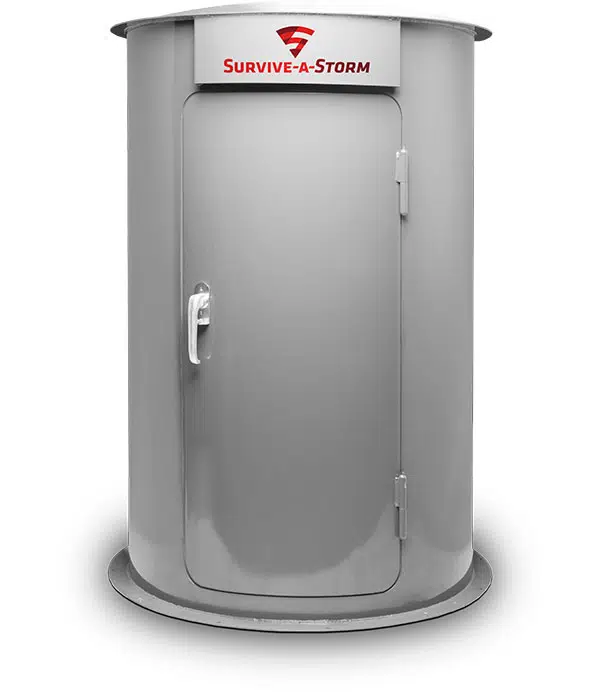
Survive-A-Storm manufactures a range of storm shelters, starting with the TwisterPod. Although it looks like a futuristic portable restroom, the TwisterPod is a reinforced steel tornado shelter that accommodates up to six people.
At just over 4′ wide and 6′ deep, it might be a bit of a squeeze for some families, especially as it has built-in benches.
If you want to upgrade, at 5.5′ x 6′, the TwisterPod Max offers four people a little more breathing space or six people a place to hunker down during a storm.
It’s difficult to assess the structural integrity of the TwisterPod as few technical specifications are available on the company website.
The Extreme storm shelter, a little bigger than the TwisterPod, is made with reinforced 1/4 inch steel with 5.4 lb reinforcements, which is more than enough to give you peace of mind and protection. It still doesn’t allow much space, however. The smallest version measures 4′ x 4′ x 6.5′ and can accommodate a family of five.
This shelter also comes with an emergency escape hatch and internal locking mechanisms that make it a secure safe room, as well as a storm shelter.
Check them out – Survive-A-Storm Shelters
#7 Protection Shelters
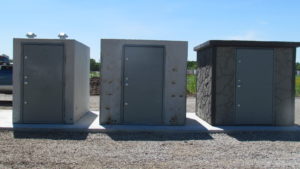
In addition to a steel unit like those discussed above, Protection Shelters offers a concrete residential shelter that requires no additional anchoring. Made with high-strength concrete that can withstand 6,000 PSI, this unit is reinforced with fiber mesh and steel bars and features 4″ thick walls.
You can build this unit on an existing patio or concrete pad or opt to have one installed along with your shelter. It’s available in two sizes – 4’8″ x8’8″ or 6’8″ x6’8″.
If you don’t have the space outside or don’t want a concrete eyesore in your backyard, why not opt for a custom garage tornado shelter instead? Available in various sizes, this steel shelter can be bolted and anchored to an existing concrete floor.
Both models can be adapted for wheelchair access and meet the highest standards for storm shelters, including the latest FEMA regulations.
Check them out – Protection Shelters
#8 Tornado Alley Armor
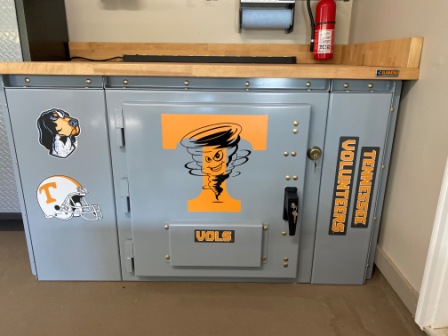
Taking a slightly different approach to storm shelter solutions, Tornado Alley Armor has a variety of shapes and sizes available. The most innovative but not necessarily practical design is the Lifesaver Workbench.
This storm shelter doubles up as a workbench, so it frees up space while simultaneously providing emergency protection. At just 3’2″ high, you won’t be able to stand up but if you don’t mind lounging around until the storm passes provides more than adequate protection.
Made with 10 gauge steel, these storm shelters aren’t quite as robust as those with ¼” steel walls, but they’ve been thoroughly tested and meet FEMA’s criteria for residential safe rooms.
You can either have your storm shelter professionally installed or do it yourself, using the company’s detailed instructions, how-to videos, and support services.
In addition to the Lifesaver Workbench, Tornado Alley Armor also has standard-shaped shelters available, including the 3’4″ x 3’4′ Defiant, which looks like an old phone booth, and the 2’6″ x 6’10” Defender, which provides a spacious refuge for a family of four.
Check them out – Tornado Alley Armor
#9 Survival Zone Safe Rooms
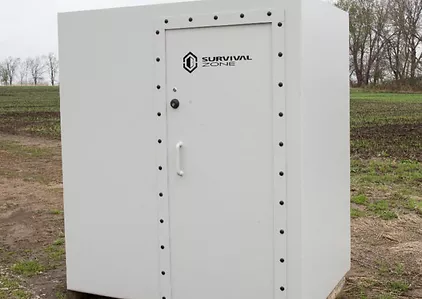
Survival Zone offers two basic designs – the Tank and the Knight. Made from 3/8″ steel, the Tank is one of the most robust storm shelters. It exceeds the standards set for above-ground storm shelters and can be customized to meet your specific needs.
The Tank also has a 3/8″ steel door reinforced with cold-rolled steel locks and hinge pins, while the Knight features a ¼” steel structure that provides ample protection against intruders and tornadoes.
Both units have a steel lip around the base to improve stability and have been thoroughly tested at Texas Tech’s Debris Impact Facility.
Check them out – Survival Zone Safe Rooms
#10 Swisher Safety Shelters

Professionally engineered and thoroughly tested, Swisher’s safety shelters are large and spacious. The smallest unit is just under 3′ wide and over 6′ deep, making it suitable for about six people. If you need your storm shelter to be wheelchair friendly, however, you’ll need to opt for a much larger unit.
All the Swisher shelters are built using 3/16″ carbon steel and feature sliding doors that are less likely to get stuck or damaged during a tornado. They also have additional locking pins that can only be removed from the inside, making them great safe rooms and storm shelters. Emergency panels are also provided in case of an emergency.
As good as they are, there’s little to justify the company’s somewhat inflated price range, except that they appear more geared towards businesses than residential properties.
Check them out – Swisher Safety Shelters
What To Consider Before Purchasing an Above-Ground Storm Shelter
Building Permits and Legislation
Regardless of how desperate you might be for some solid storm protection, you still need to play by the rules. In some states, that means applying for a building permit before constructing an outdoor, above-ground storm shelter.
Of course, this won’t apply to safe rooms or shelters constructed inside and may make that option more viable.
Read: Natural disasters state ranking
Accessibility
Above-ground storm shelters are much easier and quicker to access than underground storm shelters, which is part of their appeal.
Having flat ground to the shelter will make access even easier if you’ve got young children or more mature family members.
Maybe you’ve got wheelchair users you need to consider, so a customized MAX Shelter from FamilySAFE is probably your more affordable and convenient option.
Location
Access to interior storm shelters can quickly become blocked as the usual paraphernalia of life builds up. Whether in your garage or basement, you need to keep access clear; otherwise, there’s no point in having the shelter in the first place.
If you’ve opted for an external tornado shelter, it must be no further than 150′ from your home. You also need to consider the potential dangers of power lines, neighboring structures, and large trees that could, in a severe storm, block access to and from the shelter.
Occupancy
In addition to the people you need to protect, consider whether you need extra room for pets and valuables.
Survive-A-Storm’s TwisterPod might be big enough for a family of four at a squeeze, but throwing two dogs and a hamster into the mix could get a little cramped.
Conclusion
Storms, tornadoes, and severe weather conditions threaten our livelihoods and infrastructure.
When howling winds start shaking your home to its very foundations, a storm shelter could save your life and the lives of those you love.
Whether you opt for an interior safe room or an external tornado shelter, structural integrity is vital, which is why you should only consider storm shelters that meet the criteria laid out by the FEMA and ICC.
Also read: DIY Storm Shelter



Great article
I live in ga, 30228 I don’t have a basement, cleaning out 2 car garage been reading and ready to buy a storm shelter from any company that’s fema qualified. But here in ga these out of state companies only sell it and drop it off, I need the whole package purchase and installation. How can we unsheltered Georgian get in on this fabulous way of protecting our family and friends where are the contractors that install these shelters…
Thank you for the information provided. It was very helpful. Now to find a company that will drive the distance, as we are located 100 miles or more from most large cities in the surrounding area.